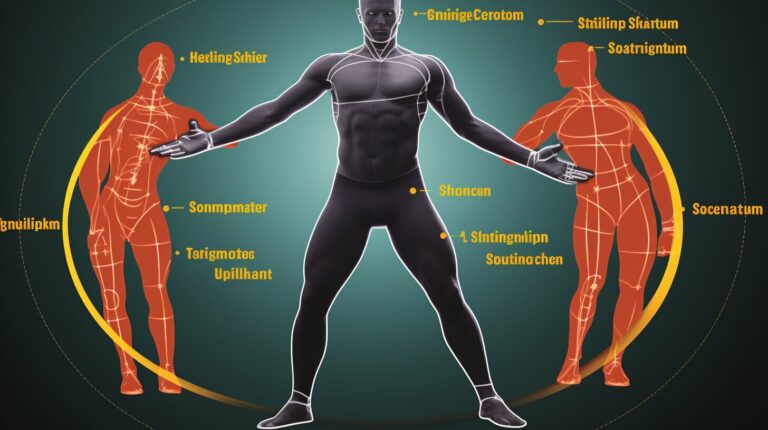What is the #1 Secret to Weight Loss?
Are you tired of searching for the ultimate weight loss secret? Look no further! In this article, I will reveal the most effective weight loss secrets that can help you achieve your goals and maintain a healthy weight for the long term.
When it comes to losing weight, there is no magic pill or quick fix. Instead, it’s about adopting sustainable lifestyle changes that you can stick with over time. Cutting carbs, eating more protein, lifting weights, and getting enough sleep are all actions that can promote sustainable weight loss.
One of the best secrets for weight loss is to focus on your long-term health and develop habits that support your overall well-being. Eating a balanced diet that includes protein, fat, vegetables, and complex carbohydrates is key. Adequate protein intake can help preserve muscle mass while losing weight and reduce cravings. Including a variety of vegetables in your meals can provide essential nutrients and support weight loss. Choosing healthy fats like olive oil, avocado, nuts, and seeds can also contribute to weight loss.
Incorporating regular exercise into your routine is another secret tip for weight loss. Combining aerobic exercise with weight training can maximize your calorie burn and improve overall health. Increasing fiber intake can promote feelings of fullness and support weight loss. Practicing mindful eating can help you avoid overeating and make healthier food choices. And don’t forget to stay hydrated by drinking plenty of water or low-calorie beverages.
As you can see, there are no shortcuts or secrets tricks for weight loss. It’s all about making sustainable lifestyle changes that will improve your health and help you achieve lasting results. So, start implementing these effective weight loss secrets today and see the difference they can make in your journey toward a healthier, happier you.
Key Takeaways:
- Eat a balanced diet that includes protein, fat, vegetables, and complex carbohydrates.
- Engage in regular aerobic exercise and weight training.
- Increase fiber intake through fruits, vegetables, whole grains, and legumes.
- Practice mindful eating to avoid overeating and make healthier choices.
- Stay hydrated by drinking water and low-calorie beverages.
How to Lose Weight in 6 Simple Steps:
Are you looking for effective weight loss strategies that are simple and easy to follow? Look no further! In this section, I will outline six simple steps that will help you on your weight loss journey. Follow these steps and watch the pounds melt away.
- Eat a Balanced Diet: A balanced diet is the foundation of effective weight loss. Make sure your meals include a good balance of protein, fat, vegetables, and complex carbohydrates. This will provide your body with the nutrients it needs while keeping you satisfied and energized.
- Engage in Regular Aerobic Exercise: Incorporating regular aerobic exercise into your routine is crucial for burning calories and promoting weight loss. Whether it’s walking, jogging, cycling, or any other activity you enjoy, aim for at least 30 minutes of exercise most days of the week.
- Increase Fiber Intake: Boost your fiber intake by incorporating fruits, vegetables, whole grains, and legumes into your diet. High-fiber foods not only help you feel full but also aid in digestion and promote overall health.
- Practice Mindful Eating: Pay attention to your body’s hunger and fullness cues, and avoid emotional eating. By practicing mindful eating, you can develop a better relationship with food and make healthier choices.
- Stay Hydrated: Drinking plenty of water and low-calorie beverages throughout the day not only keeps you hydrated but also helps reduce food intake. Make sure to drink at least 8 glasses of water a day to support your weight loss efforts.
- Get Enough Sleep: Adequate sleep is essential for weight loss and hormone regulation. Aim for 7-9 hours of quality sleep each night to support your body’s natural processes and promote overall well-being.
By following these six simple steps, you can establish healthy habits that will lead to effective weight loss. Remember, sustainable weight loss is a journey, so be patient and stay consistent. You’ve got this!
The Role of Lifestyle in Weight Loss
When it comes to weight loss, making long-term lifestyle changes is key to achieving sustainable results. It’s not just about following a specific diet or exercise plan; it’s about adopting healthy habits and making lasting adjustments to your everyday life.
Eating a balanced diet is one of the fundamental lifestyle changes for weight loss. By incorporating a variety of nutritious foods, such as lean proteins, whole grains, fruits, vegetables, and healthy fats, you can fuel your body properly while managing your weight.
Another crucial aspect of lifestyle change is regular physical activity. Engaging in both aerobic exercises and strength training not only helps burn calories but also builds lean muscle mass, which can boost your metabolism in the long run.
Managing stress is also an important factor in weight loss. High stress levels can lead to emotional eating and unhealthy food choices. Finding healthy coping mechanisms, such as meditation, yoga, or spending time with loved ones, can help reduce stress and support your weight loss journey.
Getting enough sleep plays a significant role in weight management as well. Sleep deprivation can lead to hormonal imbalances that affect appetite regulation, increase cravings, and hinder weight loss progress. Aim for 7-9 hours of quality sleep each night to support your overall health and weight loss efforts.
Finally, surrounding yourself with a supportive social network and seeking professional guidance can greatly contribute to successful weight loss and long-term maintenance. Having like-minded individuals who share similar goals can provide motivation, accountability, and a sense of community.
Remember, sustainable weight loss is not about quick fixes or short-term diets. It’s about making gradual, healthy changes to your lifestyle that you can maintain in the long run.

Making these lifestyle changes may require effort and commitment, but they offer the greatest chance of achieving and maintaining your desired weight. By adopting healthy eating habits, engaging in regular exercise, managing stress, prioritizing sleep, and seeking support, you can create a lifestyle that supports your weight loss goals.
The Role of Exercise in Weight Loss
Exercise is a crucial component of any weight loss journey. Not only does it help you burn calories and shed unwanted pounds, but it also offers numerous other benefits for managing your weight effectively.
Physical activity is a key factor in weight loss as it increases calorie expenditure. By engaging in exercises such as walking, running, cycling, or swimming, you can burn extra calories and create a calorie deficit, leading to weight loss over time.
Combining aerobic exercises with strength training can be particularly effective for maximizing weight loss and preserving muscle mass. While aerobic exercises boost your heart rate and burn calories, strength training helps build lean muscle. This combination not only aids in weight loss but also improves your metabolism, allowing you to continue burning calories even at rest.
Regular exercise also plays a vital role in maintaining weight loss. It helps correct a “broken” metabolism, which can occur due to prolonged calorie restriction or weight loss without exercise, making it easier to maintain your desired weight.
It’s important to incorporate physical activity into your daily routine, not just during structured workouts. Small changes such as taking the stairs instead of the elevator, parking farther away, or walking instead of driving can significantly contribute to your overall calorie burn throughout the day.
Building lean muscle through exercise also offers long-term benefits for weight loss. Muscle is more metabolically active than fat, meaning it burns more calories even at rest. By incorporating strength training exercises into your routine, you can increase your muscle mass and boost your metabolism, supporting sustainable weight loss.
Make sure to choose exercises that you enjoy and can maintain over time. Whether it’s dancing, hiking, swimming, or attending fitness classes, finding activities you love will help you stay motivated and consistent in your weight loss journey.
In summary, exercise is a powerful tool for weight loss. It increases calorie expenditure, improves metabolic health, and helps maintain long-term weight loss. By incorporating aerobic exercises, strength training, and physical activity into your daily life, you can achieve your weight loss goals and improve your overall well-being.
Conclusion:
Achieving and maintaining weight loss requires a comprehensive approach that includes healthy eating, regular physical activity, and lifestyle changes. Quick-fix diets and drastic restrictions may yield temporary results, but focusing on long-term habits and sustainable strategies is key to lasting success.
A balanced diet plays a crucial role in weight loss. Including protein, healthy fats, vegetables, and complex carbohydrates in your meals provides essential nutrients while supporting your weight loss goals.
A combination of aerobic exercise and strength training is important for burning calories, preserving muscle mass, and promoting overall health. Find activities you enjoy and make them a regular part of your routine.
Additionally, incorporating fiber-rich foods, practicing mindful eating, staying well-hydrated, getting enough sleep, and managing stress are all essential components of a successful weight loss journey.
Remember, finding an approach that works for you and seeking professional guidance if needed is crucial. Stay committed to your goals, be patient with yourself, and make sustainable changes that will lead to long-term weight loss and improved health.
FAQ
What is the #1 secret to weight loss?
The #1 secret to weight loss is focusing on long-term health and habits that you can stick with over time. Quick-fix diets and drastic restrictions may lead to temporary weight loss, but they are not sustainable in the long run. By prioritizing a balanced diet that includes protein, fat, vegetables, and complex carbohydrates, engaging in regular exercise, staying hydrated, getting enough sleep, and managing stress, you can achieve lasting weight loss.
How to lose weight in 6 simple steps?
Here are 6 simple steps to lose weight:
1. Eat a balanced diet that includes protein, fat, vegetables, and complex carbohydrates.
2. Engage in regular aerobic exercise, such as walking, jogging, or cycling.
3. Increase your fiber intake by consuming fruits, vegetables, whole grains, and legumes.
4. Practice mindful eating by paying attention to hunger and fullness cues and avoiding emotional eating.
5. Stay hydrated by drinking plenty of water and low-calorie beverages.
6. Get enough sleep to support weight loss and hormone regulation.
What is the role of lifestyle in weight loss?
Lifestyle plays a crucial role in weight loss. Making long-term changes to your eating habits, such as eating a balanced diet and practicing portion control, is important for promoting weight loss. Engaging in regular physical activity, including both aerobic exercise and strength training, helps burn calories and maintain muscle mass. Additionally, managing stress, getting enough sleep, and avoiding negative habits like smoking contribute to overall health and weight management.
What is the role of exercise in weight loss?
Exercise plays an important role in weight loss by increasing calorie expenditure and improving metabolic health. Combining aerobic exercise, such as walking, running, or cycling, with strength training can maximize weight loss and help preserve muscle mass. Regular exercise can also help correct a “broken” metabolism and support weight maintenance. Incorporating physical activity into daily life, such as taking the stairs or walking instead of driving, can contribute to overall calorie burn.
Conclusion
Achieving and maintaining weight loss involves adopting healthy eating habits, engaging in regular physical activity, and making sustainable lifestyle changes. Focusing on long-term health and habits that you can stick with over time will improve your overall health and are more likely to result in lasting weight loss. It’s important to find an approach that works for you and seek professional guidance if needed.






